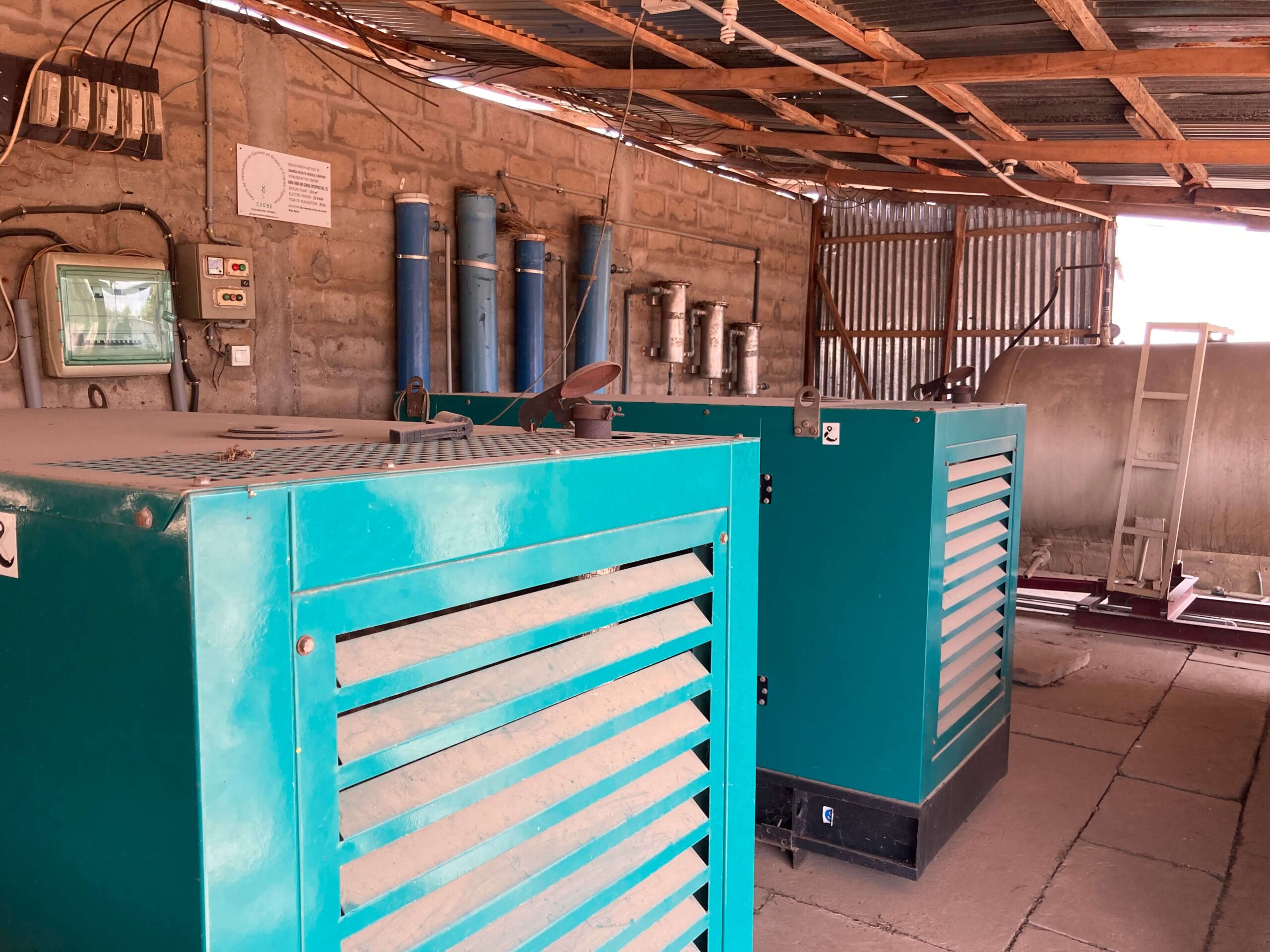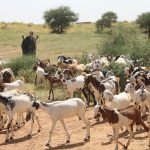RIJE, ABUJA: In 2016, a dedicated power line from the Federal Capital Territory passed through Rije, a community in Kuje Area Council of Abuja, to connect Capital Science Academy to Abuja’s electricity grid, effectively bypassing the off-grid community with zero access to electricity.
For this reason, after winning the inaugural $100 000 United States African Development Foundation Off-Grid Energy Challenge in 2015, Ajima Farms decided to build its 20 kilowatts biogas mini-grid in Rije.
The initiative excited Rije community youths that they volunteered their service and support.
“We said, ‘if we are going to see electricity in our community, we will sacrifice ourselves to make sure we see electricity,’” Aliyu Ibrahim, one of the volunteers, told Prime Progress. “They trained us on how to use the engines, effluent tanks, digesters, and [to] operate the engines.”
Ajima Farms was a small-scale poultry and livestock enterprise. The electricity project was a pilot under Ajima Farm’s “Waste-2-Watts” off-grid energy initiative meant to provide off-grid electricity to underserved communities at subsidised rates.
The construction of the biogas was completed in 2016, and it started operating for the first time in May of that year, lighting up the entire community and sparking the springing up of small businesses.
“We had barbing salons in the community because of the biogas electricity. The barbing salons and other businesses were interested in coming here because they did not need to use fuel to power their business,” said Ibrahim, who was made the plant’s manager and operator.
How it works
Biogas is produced after organic materials (plant and animal produce) are broken down by bacteria through a process called anaerobic digestion. Though anaerobic digestion occurs in nature and waste landfills, it can be controlled and contained using anaerobic digesters or livestock manure management systems.
Anaerobic digesters recycle and turn organic materials into biogas, containing an estimated 50-70% primary natural gas component called methane. This captured methane gas is used for several purposes, including producing heat and electricity in residential homes.
While the global biogas plants market is expected to hit $6.5 billion by 2026, up from $4.3 billion in 2020, biogas as a renewable energy source remains rare in most developing countries.
In Nigeria, for example, thermal energy (mostly fossil) accounts for 85% of electricity, and the remaining 15% comes from hydropower. But these combined energy sources generate a meagre 4,000MW, accounting for why only 56.5% of Nigeria’s 213 million population access electricity – just three hours average supply per day. And the rural electrification rate in Nigeria is just 36%, meaning nearly two-third of rural dwellers lack access.
With 180 million birds and 20.7 million herds of cattle, Nigeria has the second-highest poultry population and sixth largest cattle population in Africa – great potential for biogas use for electricity, as do countries like India and Sweden. Yet, of the 13 existing mini-grids generating just 236kw for 9,100 people in underserved communities across Nigeria, only the Rije mini-grid is biogas-based. And the others are solar.
The Rije plant used four underground digesters to digest chicken dung mixed with water to generate biogas, pump methane through its 20-kilowatt generators and distribute power to the community of over 500 people and 50 households.
Ibrahim said that with 16 sacks (25kg) of poultry dung, the grid can provide an average of seven to 21 hours of electricity daily in the community.
A failed project
Sadly, when Prime Progress visited the community in March 2022, it was discovered that the last time the biogas plant distributed electricity was in December 2021. And the small businesses that sprang up when the plant came alive have left.
When the biogas mini-grid began operations in 2016, it ran on chicken dung, mainly obtained for free from two medium-scale poultry farms operating in the community. The farms were happy to evacuate their poultry waste to the plant, and Ajima Farms also donated its poultry waste.
But by 2018, it became increasingly difficult to access chicken waste because the outbreak of Avian Influenza or bird flu in Abuja in 2017 led to losses that forced most farms, including those in Rije, to shut down. Ajima Farms also divested from poultry to vegetable farming.
Smaller poultry farms neighbouring the community refused to sell their poultry waste to the mini-grid because “Hausa farmers [from the far north] are always buying them with more money. They will come with pickup [vans] and buy, dry it and take it down to their states for manuring,” Ibrahim said.
“It is only during rainy seasons that we get enough waste because the Hausa farmers will not be able to dry it, so they won’t come to buy it, and if the farms leave the waste, it will start smelling.”
To keep the plant running, Ajima Farms installed subsidised prepaid meters and imposed a flat fee of N500 per month for each household accessing power from the plant. Ahmed Abdulrahman, Ajima Farms’ project engineer and technical officer, told Prime Progress that the money was intended for buying organic materials and general maintenance.
Ajima Farms had expected to realise at least N30,000 monthly, the estimated amount needed to run the plant every month, but all it could get was between N5,000 and N10,000 as most community members were not meeting up with the payment.
Abdulrahman said it became increasingly difficult to operate the plant optimally. And now, Rije is back to darkness.
Unused potential
With its large poultry and cattle population, Nigeria should have no business looking for animal waste to operate biogas. But open grazing that involves herders travelling interstate by foot with their cattle through bush paths instead of ranching is the prevailing practice here.
Open grazing means it becomes difficult to harvest cattle dung for electricity. Therefore, to operate a large-scale biogas project in Nigeria, proximity and access to organic materials must be figured out ahead of construction.
Failure to fix the access problem is why “Even at the households’ level, many of the issues associated with [biogas] have still not been resolved,” said Temilade Sesan, adjunct lecturer of renewable energy policy at the University of Ibadan. “There must be access to large farms or animal dung.”
Though the Rije Mini-grid plant was sited near farms, those farms were just two and small-sized with no guaranteed sustainability.
And siting a plant near large farms is not enough, Sesan said. It makes sense also to strike long-term win-win partnerships with the farms to ensure a regular and adequate supply of waste.
“For biogas to work sustainably at the community level, there will have to be a sort of huge farm arrangement where they have more animal waste than they know what to do with it,” the energy policy expert said.
Currently, at Rije, enthusiasm is dying among volunteer community youths. Ajima Farms’ Ibrahim said of the seven youths trained to run the plant, two have left.
But Ajima Farms is seriously looking to get things working again by partnering with the community to bring in large-scale animal farmers. The farmers would get free land to set up their farms in Rije and donate all their chicken dung to the Rije biogas plant in exchange.
But until that plan becomes a reality, Rije community would remain in darkness. Meanwhile, in 2017, Ajima Farm started setting up another plant at Kuizyi village in Abuja. But the Rije failure has since forced it to suspend further work at Kuizyi.
NOTE: For editorial reasons, the headline of this story was changed from “Rije Biogas Failure: What To Consider Before Siting A Biogas Mini-grid In Nigeria” to “How Nigeria’s Only Biogas Mini-grid Project Failed With Lessons To Learn”
In 2016, Ajima Farms built a 20-kilowatt biogas mini-grid in Rije, a community in Kuje Area Council, Abuja, Nigeria, to provide electricity to the otherwise off-grid community. This was after the community was bypassed by a dedicated power line connecting the Federal Capital Territory to Capital Science Academy. The project was made possible by winning the $100,000 United States African Development Foundation Off-Grid Energy Challenge in 2015.
The biogas plant was made operational in May 2016, using chicken dung from local poultry farms to generate electricity. This initiative spurred the growth of small businesses in Rije. However, by 2018, obtaining chicken waste became difficult due to an outbreak of Avian Influenza in Abuja in 2017, which led to the closure of many poultry farms in the area. Consequently, the plant had to shut down in December 2021 due to lack of raw materials and insufficient funding from the community.
Despite Nigeria's potential for biogas production, with a significant poultry and cattle population, the practice remains rare due to challenges in securing a regular supply of organic waste. The Rije experience highlights the necessity of long-term partnerships with large-scale farms for sustainable biogas projects. Ajima Farms is now considering partnering with large animal farmers to revive the biogas plant.
The failed project at Rije underscores the importance of ensuring a stable supply of organic materials and community cooperation for biogas plants to be viable. Meanwhile, another biogas plant project in Kuizyi village, Abuja, has been suspended due to the setback at Rije.
For biogas projects to succeed in Nigeria, strategic planning and sustainable partnerships with large farms are essential.






